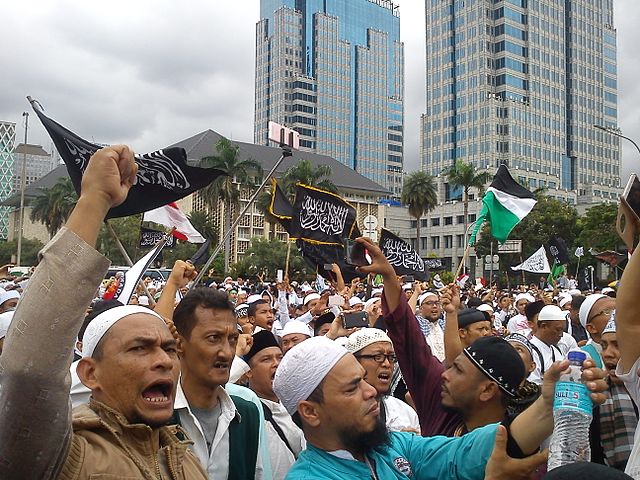'Weaponisation' of religious sentiment in Indonesia's cyberspace The announcement that prominent Indonesia Ulema Council chairma...

The announcement that prominent Indonesia Ulema Council chairman and cleric Ma’ruf Amin will be President Joko ‘Jokowi’ Widodo’s vice-presidential running mate for the 2019 election has stimulated fresh debate about the ‘Islamisation’ of Indonesian politics.
Amin is the head of Indonesia’s largest Muslim organisation, the 45-million-member Nahdlatul Ulama (NU). Jokowi’s preferred pick had been former Constitutional Court Chief Justice Mahfud MD, but he and his Indonesian Democratic Party of Struggle bowed to political pressure to choose a running mate with high-level Islamic credentials. The NU-linked National Awakening Party and United Development Party had threatened to leave Jokowi’s governing coalition if Amin were not chosen.
Islamic conservatism has been ascendant in Indonesia ever since Saudi-sponsored theological influence began in the 1980s. Growing Islamic conservatism became even more pronounced after the fall of Indonesia’s second president, Suharto, and his authoritarian ‘New Order’ regime.
Indonesia’s post-Suharto reformasi saw the opening up of public discourse, and subsequent rise of previously suppressed conservative Islamic rhetoric and its ‘hardliner’ proponents. These hardliner Islamists emerged from decades of marginalisation and repression, under the regimes of both Suharto and his predecessor Sukarno, with little appetite for pluralism and tolerance.
The proliferation of social media in Indonesia has allowed greater unrestrained expression of strong religious views. This has allowed groups such as the Muslim Cyber Army, an organisation described as being without structure and similar to the ‘hacktivist’ group Anonymous, to reach and access a larger audience.
O ne way the Muslim Cyber Army targets liberal opponents is through ‘doxing’. ‘Doxing’ refers to the theft and publishing of personal details online, which are then used by groupsâ€"such as the far-right Sunni fundamentalist group the Front Pembela Islam (Islamic Defenders Front)â€"to hunt down and physically attack their liberal opponents.
This ‘weaponisation’ of conservative Islamic sentiment and religious intolerance has involved doctored online content and disinformation, deliberately spread through social media. As more Indonesians have gained access to the internet, mainly through low-cost smartphone technology, Indonesia has developed a disinformation problem.
The most prominent example of this phenomenon was the 2017 jailing of former Jakarta governor Basuki Tjahaja Purnama (Ahok) for two years for alleged blasphemy. In a September 2016 speech, Ahok asserted that politicians shouldn’t mislead voters by misinterpreting the Koran in advising Muslims a gainst voting for non-Muslim political candidates. ‘Ladies and gentlemen … you’ve been lied to by those using [the Koran’s] Surah al-Maidah verse 51’, he said. The speech was then edited to seem as though Ahok was saying that it was the Koran itself that was misleading voters. The resulting video was used by anti-Ahok forces, including Ma’ruf Amin, to mobilise mass demonstrations that forced the government to charge Ahok with blasphemy.
The Indonesian government needs to reduce the effect of disinformation, especially ahead of the 2019 general election. Indonesia’s outdated legislation allows cybercriminals and botnets to thrive. The government also needs to do more to stop Indonesia from being used as a haven for these activities, which enables the spread of the doctored content that is in turn used to ‘weaponise’ Islamic sentiment.
While it’s important that Indonesia create appropriate legislative reform that helps reduce cybercrime and botnets, i t should not endanger free speech. The recent draft revision to Article 309 of the Criminal Code proposes six years’ imprisonment for ‘any person who broadcasts fake news or hoaxes resulting in a riot or disturbance’.
While the code needs to be updated, the proposed revision is worrying because it doesn’t define or explain what constitutes a ‘disturbance’ or what is considered to be ‘fake’. That’s a problem because it opens the system up to abuse: anything not approved could be labelled as ‘disturbing’. As it stands, the clause could potentially be used to prosecute journalists, threatening press freedom.
The long-awaited creation of the Badan Siber dan Sandi Negara (BSSN), Indonesia’s new national cyber agencyâ€"after years of setbacks and delaysâ€"shows that Indonesia is becoming more serious about cybersecurity. In its role as manager of Indonesia’s cyberspace as well as content moderator, the BSSN will play a pivotal role in the run-up to the 2019 general election.
The BSSN will have the difficult task of trying to protect Indonesian voters from disinformation without censoring political expression. One way it could do that is to allow individuals and groups open channels for expressing legitimate political opinion, without the threat of being criminalised as blasphemers. It’s vital that the threat represented by doctored content and disinformation doesn’t supersede the importance of BSSN remaining politically impartial.
There are plenty of opportunities for Australia and Indonesia to increase their engagement on cyber issues, which is consistent with the Australian government’s international cyber engagement strategy. Dialogues and bilateral forums should certainly continue and be increased where appropriate, not just with Indonesia but also with other more open societies in the region like Japan and South Korea.
The recently announced comprehensive strategic partnership between Australia and the Republic of Indonesia and subsequent memorandum of understanding on cyber cooperation are promising engagement strategies. The MoU is a two-year non-legally-binding agreement to share information on cyber strategies and policies, build cyber capacity through training and education programs, promote business links to enable growth in the digital economy, and tackle cybercrime by sharing training opportunities to strengthen forensic and investigation capabilities.
Australia should use both the comprehensive strategic partnership and the MoU as platforms to encourage the Indonesian government to either develop clear definitions in the proposed Criminal Code revision or scrap it altogether.
This would help promote ongoing journalistic freedom in Indonesia as well as freedom of expression more generally. The MoU also stipulates closer cooperation with the BSSN, and Australia should use that opportunity to encourage the BSSN not to fall into the trap of state censors hip, damaging Indonesia’s youthful democracy.
Source: Google News